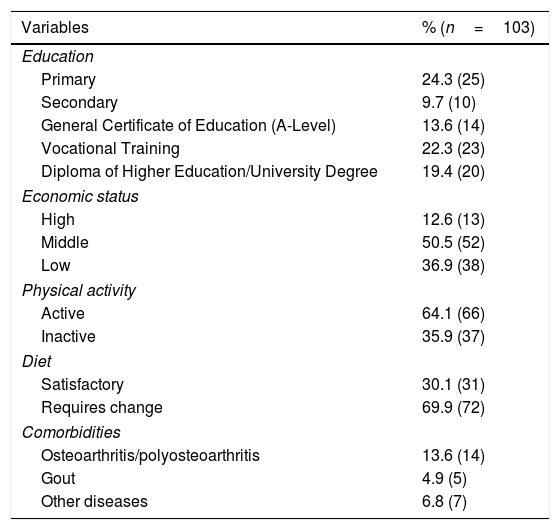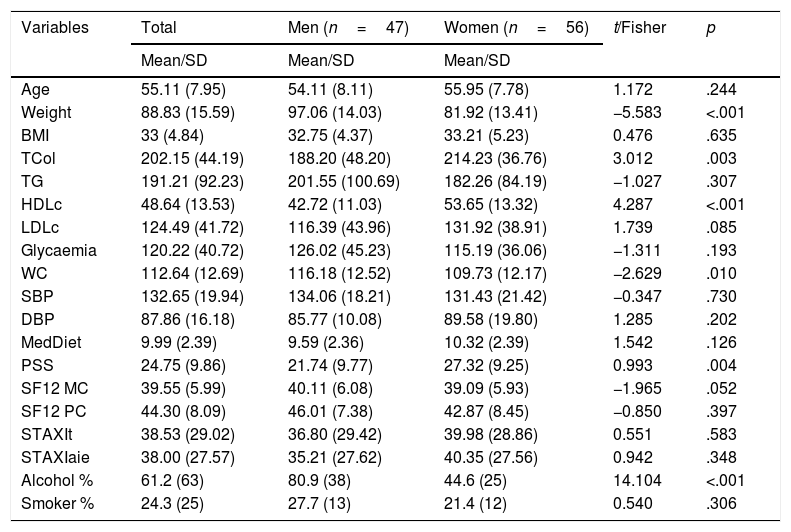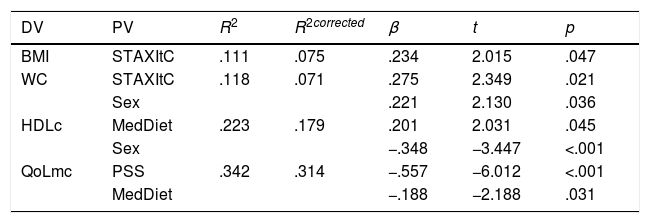Metabolic syndrome (MetS) is a cluster of metabolic conditions that include abdominal obesity, reduction in cholesterol concentrations linked to high density lipoproteins (HLDc), elevated triglycerides, increased blood pressure and hyperglycaemia. Given that this is a multicausal disease, the aim of this study is to identify the psychological, emotional and lifestyle variables that can have an influence on the different MetS components.
Patients and methodsA cross-sectional study with 103 patients with diagnostic criteria for MetS (47 male and 56 female). Anthropometric, clinical and analytical measurements were collected to assess the variables associated with MetS. The main psychological and emotional variables were also assessed.
ResultsDifferent multiple linear regression tests were performed to identify which variables were predictive of MetS. The dependent variables were body mass index (BMI), abdominal circumference, HDLc, and quality of life, and the predictive variables were psychological stress, anger and adherence to a Mediterranean diet. The results showed that psychological stress was a predictor of quality of life (β=−0.55, p≤0). Similarly, anger was a predictor of BMI (β=0.23, p=.047) and abdominal circumference (β=0.27, p=.021). As expected, adherence to a Mediterranean diet was a predictor of HDLc (β=0.2, p=.045) and of quality of life (β=−0.18, p=.031).
ConclusionsThe results confirm a link between adherence to certain dietary habits and lifestyle, however they go one step further and show the importance of psychological and emotional factors like psychological stress and anger in some MetS components.
El síndrome metabólico (SM) es un conjunto de condiciones metabólicas que incluyen obesidad abdominal, reducción de las concentraciones de colesterol unido a las high density lipoproteins (c-HDL, «lipoproteínas de alta densidad»), triglicéridos elevados, aumento de la presión arterial e hiperglucemia. Dado que se trata de una enfermedad multicausal, el objetivo de este estudio es identificar las variables psicológicas, emocionales y de estilo de vida que pueden ejercer una influencia sobre los diferentes componentes del SM.
Pacientes y métodosEstudio transversal con 103 pacientes diagnosticados de SM (47 varones y 56 mujeres). Se recogieron medidas antropométricas, clínicas y analíticas para valorar las variables asociadas al SM. También se evaluaron las principales variables psicológicas y emocionales.
ResultadosSe realizaron diferentes pruebas de regresión lineal múltiple para identificar qué variables eran predictoras del SM. Las variables dependientes fueron el índice de masa corporal (IMC), la circunferencia abdominal, el c-HDL y la calidad de vida, y las variables predictoras fueron el estrés psicológico, la ira y la adherencia a la dieta mediterránea. Los resultados mostraron que el estrés psicológico era un predictor de la calidad de vida (β=−0,55, p≤0). De igual modo, la ira fue un predictor del IMC (β=0,23, p=0,047) y de la circunferencia abdominal (β=0,27, p=0,021). Según lo previsto, la adherencia a la dieta mediterránea fue un predictor del c-HDL (β=0,2, p=0,045) y de la calidad de vida (β=−0,18, p=0,031).
ConclusionesLos resultados confirman un vínculo entre la adherencia a ciertos hábitos alimentarios y el estilo de vida; sin embargo, se sitúan un paso por delante y resaltan la importancia de los factores psicológicos y emocionales como el estrés y la ira en algunos componentes del SM.
Artículo
Comprando el artículo el PDF del mismo podrá ser descargado
Precio 19,34 €
Comprar ahora










